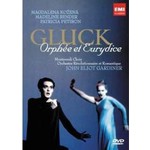
Gluck: Orphee et Eurydice (Complete opera recorded in 2000)
 $16.00
Special Order
$16.00
Special Order3 - 6 weeks add to cart
CHRISTOPH WILLIBALD GLUCK
Gluck: Orphee et Eurydice (Complete opera recorded in 2000)
Theatre Musical de Paris / Magdalena Kozena, Madeline Bender, Patricia Petibon / Monteverdi Choir / English Baroque Soloists / Sir John Eliot Gardiner
[ Warner Classics DVD / DVD ]
Release Date: Saturday 10 October 2009
This item is only available to us via Special Order. We should be able to get it to you in 3 - 6 weeks from when you order it.
 Suitable for General Audiences
Suitable for General Audiences
Stage production by Robert Wilson
Duration: 104'
filmed in 16:9 widescreen
Sung in French with English and German subtitles
When the historic Theatre du Chatelet in Paris re-opened after a period of extensive refurbishment, the first two productions mounted in the theatre were Gluck's Alceste and Orphée et Eurydice.
Both operas were sung in their French versions and were mounted and designed by Robert Wilson and conducted by John Eliot Gardiner. This was the first time Wilson and Gardiner had collaborated and their individual credentials combined to produce an exceptional result.
American polymath Wilson was responsible for some of the most ambitious avant-garde performance projects of the 1970s and 80s.Since the mid-1980s he has increasingly brought his prodigious creativity to works fiom the standard dramatic and operatic repertoire, transforming them into his own unmistakably minimalist yet grandiose visions. His styled, classical interpretations of Alceste and Orphée bear his trademarks of an uncluttered stage and the arresting use of colour and light. They are not so much timeless as, in Robert Wilson's words, "full of time". With their minutely rehearsed gestures, at once formal and poetic, the singers have the grace and elegance of Balanchine or Martha Graham dancers.
A key figure in the revival of Early Music, John Eliot Gardiner has long been a champion of Gluck's French operas and is a great Gluck conductor. He received enormous critical acclaim for his musical direction of both Orphée and Alceste at the Chatelet, as did his orchestras and chorus. He sought to rid the operas of any vestiges of remoteness or venerable respectability and to release the huge emotional charge that lies behind the beauty of Gluck's classical sobriety. The stories are, after all, he says, not only poignant and deeply moving, they have an immediate and contemporary relevance: they portray two married couples striving to protect their union and their love, plumbing the very depths of their emotional strength and summoning the courage to make huge personal sacrifices. "If presented in a way that's immediate and with tremendous intensity and truth of expression then all the dross and superficiality of the stage action falls away and you're left with what's actually a very visceral connection between two living people."
Television's top opera director, Brian Large, worked closely with Robert Wilson and John Eliot Gardiner to ensure that the translation of live performance to the small screen is of the highest artistic and techcal standard.
John Eliot Gardiner chose to use Berlioz's 1859 revision of Orphee, which adapted the tenor role of Gluck's 1774 score for the contralto voice of Pauline Viardot, adjusting the register for a mezzo-soprano. Underlining his preference for this version, he performed the opera with the nineteenth-century period instruments of his Orchestre Revolutionnaire et Romantique. His regular chorus, the Monteverdi Choir, excelled vocally and dramatically in its elegant contribution to the drama.
The Greek legend of Orpheus has captured the imaginations of many creative artists over the centuries. In this recording Magdalena Kozena brings to the role expressiveness, exceptional virtuosity and a rare emotion. Madeline Bender as Eurydice is possessed of a touching grace and beauty while Patricia Petibon is deliciously mischievous as Amour. All three of these young singers are among the cream of a new generation of operatic talent.
"In Robert Wilson's production neo-Expressionist gesture outlaws simple human emotions. But Gardiner and his orchestra are in fine fettle and Kožená an affecting Orphée despite the Frankenstein make-up." (BBC Music)
"Robert Wilson's production of Orphée et Eurydice is spare, bordering on minimalist. A blue background; cypresses in Act 1; a rock in the bleak Elysian Fields. Magdalena Kožená, then virtually unknown sings Orpheus superbly, including the bravura air in Act 1... Madeline Bender and Patricia Petibon have much less to do; they do it well..." (Gramophone)